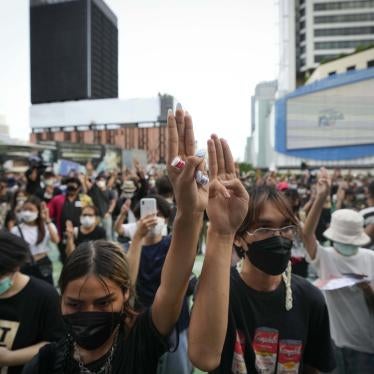(New York) – Thai authorities should immediately drop the charges and release pro-democracy activists detained for insulting the monarchy, Human Rights Watch said today. Tantawan “Tawan” Tuatulanon, who has been on a hunger strike since April 20, 2022, to protest her pre-trial detention, should be transferred to a hospital for urgent medical supervision.
“Thai authorities should drop the cases against Tantawan and others unjustly charged for their peaceful protests demanding reforms, or at least be immediately released on bail,” said Elaine Pearson, acting Asia director at Human Rights Watch. “Holding activists in lengthy pre-trial detention for the peaceful exercise of their rights is punitive and unjust.”
Tantawan, 20, who is affiliated with the pro-democracy Draconis Revolution group, has advocated reforming the monarchy and abolishing Thailand’s draconian lese majeste (insulting the monarchy) law. She has been charged with various criminal offenses, including lese majeste under article 112 of the Criminal Code for conducting a public opinion poll about royal motorcades on February 8, and posting a live Facebook broadcast criticizing the monarchy on March 5. Since April 20, the authorities have held her in pre-trial detention, which the Bangkok Criminal Court has repeatedly extended.
Other critics of the monarchy charged with lese majeste offenses in connection with the same public opinion poll are Netiporn “Bung” Sanesangkhom and Nutthanit “Bai Por” Duangmusit from the Thalu Wang group. The authorities detained them both on May 3. The authorities also arrested Sophon “Get” Surariddhidhamrong, an activist from the Mok Luang Rim Nam group, on May 1 on lese majeste charges for giving a speech at a political rally on April 22 criticizing the monarchy. He also has been put in pre-trial detention.
Article 112 of Thailand’s Criminal Code makes lese majeste punishable by up to 15 years in prison. These cases are just the latest in which Thai pro-democracy activists charged with lese majeste have been detained for lengthy periods that could go on for years until their trial is concluded, Human Rights Watch said.
Holding those charged with lese majeste in pretrial detention violates their rights under international human rights law. The International Covenant on Civil and Political Rights (ICCPR), which Thailand has ratified, encourages bail for criminal suspects. Article 9 states that, “It shall not be the general rule that persons awaiting trial shall be detained in custody, but release may be subject to guarantees to appear for trial.” Those whose charges have not been dropped should be tried without undue delay, Human Rights Watch said.
The number of lese majeste cases in Thailand has significantly increased in the past year, Human Rights Watch said. After almost a three-year hiatus in which lese majeste cases were not brought before the courts, Prime Minister Gen. Prayut Chan-ocha, in November 2020, ordered the authorities to restore lese majeste prosecutions, ostensibly because of growing criticisms of the monarchy. Since then, officials have charged more than 200 people with lese majeste crimes in relation to various activities at pro-democracy rallies or comments on social media.
The ICCPR protects the right to freedom of expression. General Comment 34 of the Human Rights Committee, the international expert body that monitors compliance with the covenant, states that laws such as those for lese majeste “should not provide for more severe penalties solely on the basis of the identity of the person that may have been impugned” and that governments “should not prohibit criticism of institutions.”
“The Thai government should stop punishing peaceful dissenters and demonstrate respect for human rights by permitting all viewpoints,” Pearson said. “The authorities in Thailand should engage with United Nations experts and others about amending the lese majeste law to bring it into compliance with international human rights law obligations.”









